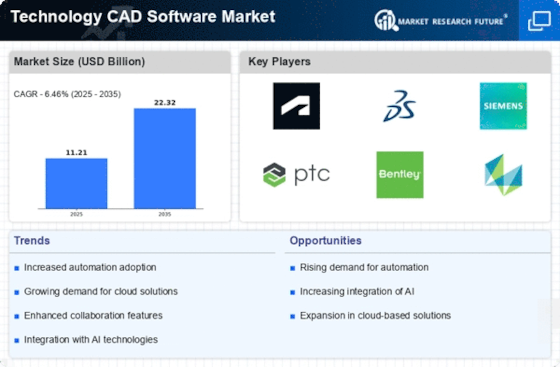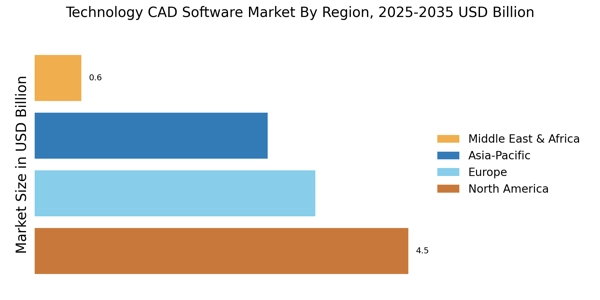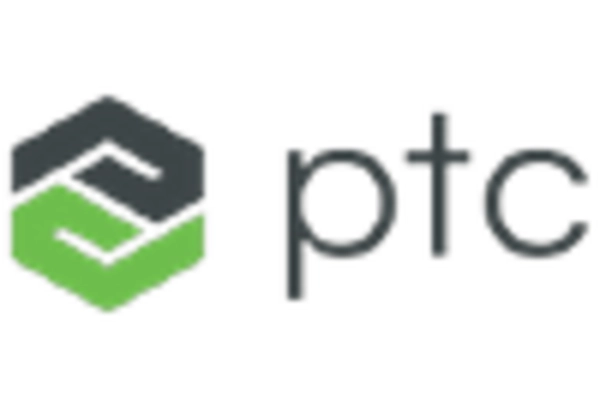Rising Demand for 3D Modeling
The Technology CAD Software Market is experiencing a notable increase in demand for 3D modeling capabilities. Industries such as architecture, engineering, and manufacturing are increasingly adopting 3D modeling tools to enhance design accuracy and visualization. According to recent data, the market for 3D CAD software is projected to grow at a compound annual growth rate of approximately 7.5% over the next five years. This growth is driven by the need for more sophisticated design solutions that can accommodate complex geometries and improve collaboration among stakeholders. As organizations seek to streamline their design processes, the integration of advanced 3D modeling features into CAD software becomes essential, thereby propelling the Technology CAD Software Market forward.
Sustainability Initiatives in Design
Sustainability initiatives are increasingly influencing the Technology CAD Software Market as organizations strive to reduce their environmental impact. CAD software is being utilized to create designs that minimize waste and optimize resource use, aligning with global sustainability goals. Recent reports indicate that the market for sustainable design software is expected to grow significantly, driven by regulatory pressures and consumer demand for eco-friendly products. CAD tools that incorporate sustainability features, such as lifecycle analysis and material optimization, are becoming essential for companies aiming to enhance their green credentials. As sustainability becomes a core focus for many industries, the Technology CAD Software Market is likely to see a surge in demand for software that supports these initiatives.
Integration of Artificial Intelligence
The integration of artificial intelligence (AI) into CAD software is emerging as a transformative driver within the Technology CAD Software Market. AI technologies enhance design processes by automating repetitive tasks, optimizing designs, and providing predictive analytics. This integration not only improves efficiency but also allows designers to focus on more creative aspects of their work. Market analysis suggests that AI-driven CAD tools could increase productivity by up to 30%, making them highly attractive to businesses aiming to reduce time-to-market. As AI continues to evolve, its applications in CAD software are expected to expand, further influencing the Technology CAD Software Market and encouraging innovation across various sectors.
Increased Adoption of Cloud Technologies
The Technology CAD Software Market is witnessing a significant shift towards cloud-based solutions. The adoption of cloud technologies allows for enhanced collaboration, accessibility, and scalability, which are crucial for modern design workflows. Recent statistics indicate that the cloud CAD market is expected to reach a valuation of over 2 billion USD by 2026. This trend is particularly beneficial for remote teams and organizations with multiple locations, as it facilitates real-time updates and sharing of design files. Furthermore, cloud-based CAD solutions often come with subscription models, reducing upfront costs and making advanced design tools more accessible to small and medium-sized enterprises. As a result, the transition to cloud technologies is likely to continue driving growth within the Technology CAD Software Market.
Focus on Customization and User Experience
Customization and user experience are becoming increasingly important in the Technology CAD Software Market. As users demand more tailored solutions that fit their specific workflows, software developers are responding by offering customizable interfaces and features. This trend is particularly evident in industries such as automotive and aerospace, where unique design requirements necessitate specialized tools. Recent surveys indicate that over 60% of CAD users prioritize software that allows for personalization. By enhancing user experience through customization, companies can improve productivity and satisfaction, which in turn drives adoption rates. Consequently, the emphasis on user-centric design is likely to play a pivotal role in shaping the future of the Technology CAD Software Market.

















